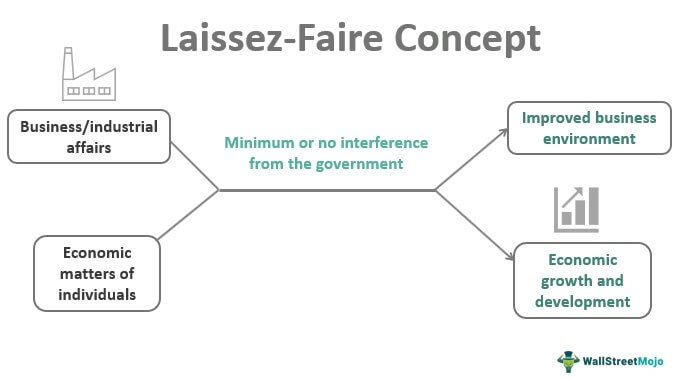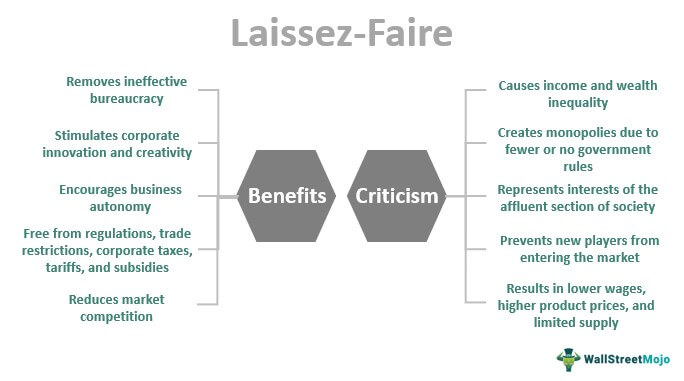Laissez Faire Economists of the 19th Century Argued That
The theoretical basis of government policy toward American business has been provided for more than 200 years by laissez-faire Laissez-faire or leave-it-alone in a translation from the French is a concept allowing private interests to have a virtual free rein in operating business. Karl Marx predicted that laissez-faire capitalism would result in.
/laissez-faire-definition-4159781-V2-828107953ee443f1bdeaaaba9b35759b.jpg)
What Is Laissez Faire Economic Theory
A return to manorialism.

. In accordance with the. Laissez-faire is an economic theory from the 18th century that opposed any government intervention in business affairs. The government should regulate the economy.
Until 1840s education was available only to wealthy people. Laissez faire is an injunction to let us free. Laissez-faire economists of the 19th century argued that individuals should be allowed to pursue their self-interest in a free market Where did Karl Marx predict a.
Why were public schools needed in the late 1800s. This idea originated when Scottish economist William Byer wrote The. Laissez-Faire economists of the 19th century argued that.
It is consistent with Schatzs reserve towards the laissez-faire defended by French economists in the 18th and 19th-century that after explaining the origin of. Karl Marx predicted that laissez-faire capitalism would result in. In the mid-19th century the United States followed the Whig tradition of economic nationalism which included increased state control regulation and macroeconomic development of infrastructure.
Many reformers who opposed the Laissez-faire attitude of the late 19th century argued that. Lloyd Mints 31 4 widely regarded as the authority in this area offers the following judgment. The driving principle behind laissez-faire a French term that translates to leave alone literally let you do is that the less the government is involved in the economy the better off business will be and by extension society as a whole.
The government supported business 22People who believed in laissez faire argued that government should take a hands off approach to business. Among the advantages of the laissez-faire concept are. Reformers who wanted all children to gain the benefits of education opposed this.
True or false 21In the late 19th century the labor movement was not very effective. Individuals should be allowed to pursue their self-interest in a free market What social. See answer 1 Best Answer.
Government should protect society through the regulation of business. During the late 1800s the defenders of Social darwinism would most likely have supported. The good of Laissez-faire.
They dont need to set aside money just to pay taxes. The term laissez-faire means in French allow to do. Wildcat strikes were violent.
Laissez-faire economists of the 19th century argued that individuals should be allowed to pursue their self-interest in a free market Which statement represents a. Laissez-faire economists of the 19th century argued that. Mainstream Attitudes toward Regulation of Money and Banking If there is a standard view of nineteenth-century American monetary thought it is that laissez-faire ideas were commonplace.
Laissez-faire is a policy of minimum governmental interference in the economic affairs of individuals and society. The doctrine of laissez-faire is usually associated with the economists known as Physiocrats who flourished in France from about 1756 to 1778. Like other political and economic ideologies laissez-faire also has pros and cons.
The Austrian School owes its name to members of the German historical school of economics who argued against the Austrians during the late-19th century Methodenstreit methodology struggle in which the Austrians defended the role of theory in economics as distinct from the study or compilation of historical circumstance. Laissez-faire laissez-faire laissez-faire lĕsā fâr Frleave alone in economics and politics doctrine that an economic system functions best when there is World Fairs Worlds fairs are modern events of the nineteenth and twentieth centuries. The 18th-century Scottish economist Adam Smith strongly influenced the development of ideas about.
Laissez-faire economists of the 19th century argued that 1 the government should regulate the economy and foreign trade 2 individuals should be allowed to pursue their self-interest in a free market 3 governments should develop a state-run banking system to prevent instability 4 anarchy would result if universal male suffrage was granted. A revolution led by the proletariat. Whereas medieval fairs were concerned with the selling of goods modern wo Fair fair1 feər adj.
Laissez-faire economists of the 19th century argued that. In the early 19th century it is quite clear that the laissez-faire label is an inappropriate one to apply to the relationship between the United States government and industry. Since taxes dont exist firms and households have greater purchasing power.
The derived substantive is laissez-faire However it is sometimes written as laisser-faire which by analogy to laisser-aller connotes an attitude of scruffiness. LAISSEZ-FAIRE MONETARY THEORISTS 775 II. A return to manorialism.
The middle class feared labor violence. Laissez-faire economists of the 19th century argued that.
:max_bytes(150000):strip_icc()/adam-smith-economics_final2-261ec50cfb04406585d7a298858eb4bb.png)
Who Was Adam Smith Why Is He Considered The Father Of Economics

Agrarian Revolution Event That Sparked The Industrial Revolution New Technologies And Farming Methods Jethro Tull S Seed Drill Enclosure Movement Ppt Download

No comments for "Laissez Faire Economists of the 19th Century Argued That"
Post a Comment